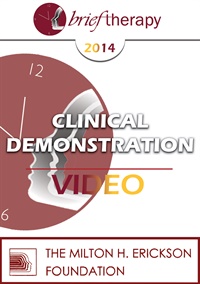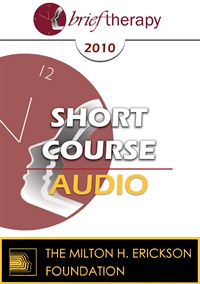
- Average Rating:
- Not yet rated
- Topic Areas:
- Cognitive Behavior Therapy (CBT) | Depression | Short Courses | Mindfulness | Attention Deficit Disorder (ADD)
- Categories:
- Brief Therapy Conference | Brief Therapy Conference 2010
- Faculty:
- Joseph Sestito, MSSA, LISW-S
- Duration:
- 1:29:31
- Format:
- Audio Only
- Original Program Date:
- Dec 09, 2010
- Short Description:
- The basics about mindfulness and cognitive-behavioral therapy will be explained, along with the research findings which show that aerobic exercise helps both ADD and depression through improving brain functioning. Participants will become acquainted with ten mindfulness skills, four CBT methods and five types of aerobic exercise which can help their clients. Participants will see how they can be the instruments who help their clients deliver themselves from distraction to distinction. With Joseph Sestito.
- Price:
- $15.00 - Base Price
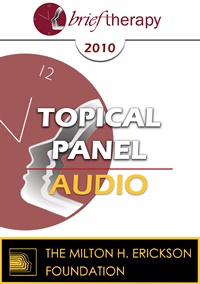
- Average Rating:
- Not yet rated
- Topic Areas:
- Depression | Topical Panels | Brief Therapy
- Categories:
- Brief Therapy Conference | Brief Therapy Conference 2010
- Faculty:
- Jon Carlson | Bill O'Hanlon, MS | Casey Truffo, M.S.,M.F.T. | Michael Yapko, PhD
- Duration:
- 58:30
- Format:
- Audio Only
- Original Program Date:
- Dec 11, 2010
- Short Description:
- BT10 Topical Panel 02 - Brief Therapy for Depression - Jon Carlson, PsyD, EdD, Bill O’Hanlon, MS, Casey Truffo, MS, MFT, Michael Yapko, PhD
- Price:
- $15.00 - Base Price
Tags: Brief Therapy Depression
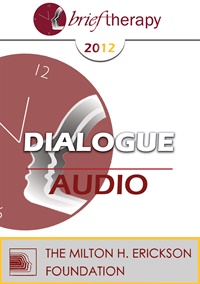
- Average Rating:
- Not yet rated
- Topic Areas:
- Depression | Dialogues | Brief Therapy
- Categories:
- Brief Therapy Conference | Brief Therapy Conference 2012
- Faculty:
- Erving Polster, PhD | Michael Yapko, PhD
- Duration:
- 56:07
- Format:
- Audio Only
- Original Program Date:
- Dec 07, 2012
- Short Description:
- BT12 Dialogue 08 - Social Factors in Depression - Erving Polster, PhD, Michael Yapko, PhD Educational Objectives: Given a topic, describe the differing approaches to psychotherapy, and identify the strengths and weaknesses of each approach.
- Price:
- $15.00 - Base Price
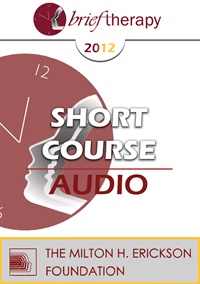
- Average Rating:
- Not yet rated
- Topic Areas:
- Depression | Short Courses
- Categories:
- Brief Therapy Conference | Brief Therapy Conference 2012
- Faculty:
- Jeanne Hernandez
- Duration:
- 1:29:08
- Format:
- Audio Only
- Original Program Date:
- Dec 05, 2012
- Short Description:
- BT12 Short Course 17 – Borrowing From Erickson’s Native American Roots to do Brief Therapy That Changes Lives and Lifestyles – Jeanne Hernandez, PhD This workshop explores the Native American principles such as harmony, hope and respect as they relate to Ericksonian brief therapy, and introduces exercise for grounding and internal stability that ward off stress, depression and daily conflict and that simplify complex decision-making in life, all of which bring clients to therapy.
- Price:
- $15.00 - Base Price
Tags: Multi-Cultural
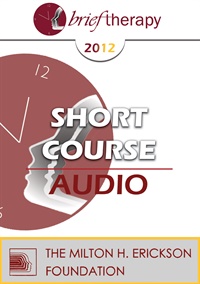
- Average Rating:
- Not yet rated
- Topic Areas:
- Psychotherapy | Anxiety | Depression | Short Courses
- Categories:
- Brief Therapy Conference | Brief Therapy Conference 2012
- Faculty:
- Virgil Hayes, DO
- Duration:
- 1:24:45
- Format:
- Audio Only
- Original Program Date:
- Dec 05, 2012
- Short Description:
- BT12 Short Course 25 – How to Thoroughly Co-Create Brief Therapy Efficiently and Effectively – Virgil Hayes, DO, MSW Psychotherapy is a blend of art and science. However, the art of using a conceptual framework to co-create solutions is overlooked in favor of medical paradigms. This short course focuses on non-medical understandings of anxiety and depression creation to enable the clinician to be more effective in co-creating solutions. Case discussion and lecture for all skill levels.
- Price:
- $15.00 - Base Price
Tags: Psychotherapy Anxiety Depression
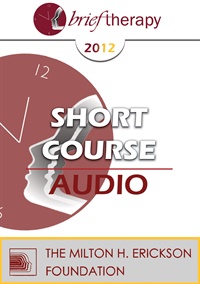
- Average Rating:
- Not yet rated
- Topic Areas:
- Anxiety | Depression | Short Courses | Communication | Neurobiology
- Categories:
- Brief Therapy Conference | Brief Therapy Conference 2012
- Faculty:
- Bart Walsh, MSW
- Duration:
- 1:55:20
- Format:
- Audio Only
- Original Program Date:
- Dec 09, 2012
- Short Description:
- BT12 Short Course 51 – Effective Management of Chronic Anxiety and Depression with Essential Neurobiological Communication – Bart Walsh, MSW Learn how to access deep levels of mind-body functioning for remission of chronic anxiety and depression. Essential neurobiological communication (ENBC) incorporates a form of body language known as ideomotor signaling. Affected individuals learn to fully manage these chronic conditions. Resolve past emotion using a noninvasive protocol integrating a progressive ratification sequence for grounding emotional adjustments in thought, perception and behavior.
- Price:
- $15.00 - Base Price
Tags: Anxiety Depression
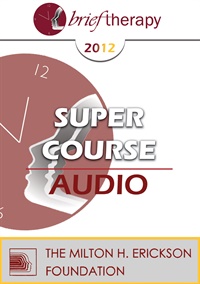
- Average Rating:
- Not yet rated
- Topic Areas:
- Depression | Hypnosis | Super Courses | Experiential Therapy | Mindfulness | Brief Therapy
- Categories:
- Brief Therapy Conference | Brief Therapy Conference 2012
- Faculty:
- Michael Yapko, PhD
- Duration:
- 4:42:27
- Format:
- Audio Only
- Original Program Date:
- Dec 09, 2012
- Short Description:
- The cutting edge of rapidly expanding scientific evidence highlights that the more we learn about the biology of depression, the more important psychology and social experiences become in shaping recovery on all levels. Participants will learn to utilize therapy as a social process that can teach clients skills experientially in order to reduce and even prevent depression. Interventions involving skill building homework assignments, and experiential methods of hypnosis and mindfulness will be considered in depth through group hypnosis and at least one skill-building exercise.
- Price:
- $15.00 - Base Price
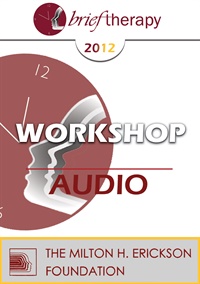
- Average Rating:
- Not yet rated
- Topic Areas:
- Depression | Workshops
- Categories:
- Brief Therapy Conference | Brief Therapy Conference 2012
- Faculty:
- Bill O'Hanlon, MS
- Duration:
- 2:35:18
- Format:
- Audio Only
- Original Program Date:
- Dec 06, 2012
- Short Description:
- BT12 Workshop 13 – The Lincoln Perspective: Lesson About Coping with an Overcoming Depression from an American President – Bill O’Hanlon, MS Abraham Lincoln suffered from what was known as “melancholy” most of his life. In this presentation, you will learn the effective coping and self-treatment strategies he used to deal with and overcome lifelong depression. An inspirational talk with lessons for modern clinicians and clients.
- Price:
- $15.00 - Base Price
Tags: Depression
- Average Rating:
- Not yet rated
- Topic Areas:
- Clinical Demonstrations | Anxiety | Depression | Trauma | Neuroscience | Brief Therapy
- Categories:
- Brief Therapy Conference | Brief Therapy Conference 2014
- Faculty:
- Ernest Rossi, PhD
- Course Levels:
- Master Degree or Higher in Health-Related Field
- Duration:
- 58:34
- Format:
- Audio and Video
- Original Program Date:
- Dec 13, 2014
- Short Description:
- Group and individual demonstrations of psychosocial genomics as the art and science of counseling and psychotherapy that utilizes our natural 4-stage creative cycle for facilitating gene expression and brain plasticity to optimize the resolution of anxiety, depression, trauma and problem solving in everyday life.
- Price:
-
Sale is $29.00
price reduced from Base Price - $59.00
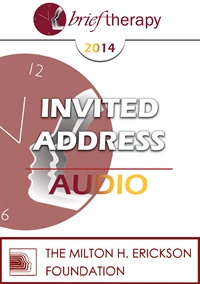
- Average Rating:
- Not yet rated
- Topic Areas:
- Depression | Hypnosis | Invited Addresses | Experiential Therapy | Neuroscience | Brief Therapy
- Categories:
- Brief Therapy Conference | Brief Therapy Conference 2014
- Faculty:
- Michael Yapko, PhD
- Duration:
- 1:08:02
- Format:
- Audio Only
- Original Program Date:
- Dec 14, 2014
- Short Description:
- How a clinician thinks about the nature of depression and answers fundamental questions - such as what causes depression - naturally determine what treatment approach he or she is most likely to take. Regardless of one’s preferred orientation, however, depression experts agree that treatment needs to be multi-dimensional and active. Furthermore, the more we learn about the neuroscience of depression, especially neuroplasticity and neurogenesis, the more important well designed experiential learning processes become in treatment.
- Price:
- $15.00 - Base Price
Please wait ...


